- Home
- J. D. Salinger
Raise High the Roof Beam, Carpenters & Seymour: An Introduction Page 2
Raise High the Roof Beam, Carpenters & Seymour: An Introduction Read online
Page 2
Suddenly, at someone’s parting—but markedly crisp—suggestion, I found myself stationed at the curb, directly at the mouth of the canvas canopy, attending to helping people into cars.
How I had been singled out to fill this post deserves some small speculation. So far as I know, the unidentified, middle-aged man of action who had picked me for the job hadn’t a glimmer of a notion that I was the bridegroom’s brother. Therefore, it seems logical that I was singled out for other, far less poetic reasons. The year was 1942. I was twenty-three, and newly drafted into the Army. It strikes me that it was solely my age, my uniform, and the unmistakably serviceable, olive-drab aura about me that had left no doubt concerning my eligibility to fill in as doorman.
I was not only twenty-three but a conspicuously retarded twenty-three. I remember loading people into cars without any degree of competence whatever. On the contrary, I went about it with a certain disingenuous, cadetlike semblance of single-mindedness, of adherence to duty. After a few minutes, in fact, I became all too aware that I was catering to the needs of a predominantly older, shorter, fleshier generation, and my performance as an arm taker and door closer took on an even more thoroughly bogus puissance. I began to conduct myself like an exceptionally adroit, wholly engaging young giant with a cough.
But the heat of the afternoon was, to say the least, oppressive, and the compensations of my office must have seemed to me increasingly tokenless. Abruptly, though the crowd of “immediate family” seemed scarcely to have begun to thin out, I myself lunged into one of the freshly loaded cars, just as it started to draw away from the curb. In doing it, I hit my head a very audible (perhaps retributive) crack on the roof. One of the occupants of the car was none other than my whispering acquaintance, Helen Silsburn, and she started to offer me her unqualified sympathy. The crack had evidently resounded throughout the car. But at twenty-three I was the sort of young man who responds to all public injury of his person, short of a fractured skull, by giving out a hollow, subnormal-sounding laugh.
The car moved west, directly, as it were, into the open furnace of the late-afternoon sky. It continued west for two blocks, till it reached Madison Avenue, and then it right-angled sharply north. I felt as though we were all being saved from being caught up by the sun’s terrible flue only by the anonymous driver’s enormous alertness and skill.
The first four or five blocks north on Madison, conversation in the car was chiefly limited to remarks like “Am I giving you enough room?” and “I’ve never been so hot in my entire life.” The one who had never been so hot in her entire life was, as I’d learned from a certain amount of eavesdropping at the curb, the bride’s Matron of Honor. She was a hefty girl of about twenty-four or -five, in a pink satin dress, with a circlet of artificial forget-me-nots in her hair. There was a distinctly athletic ethos about her, as if, a year or two earlier, she might have majored in physical education in college. In her lap she was holding a bouquet of gardenias rather as though it were a deflated volleyball. She was seated in the back of the car, hip-pressed between her husband and a tiny elderly man in a top hat and cutaway, who was holding an unlighted clear-Havana cigar. Mrs. Silsburn and I—our respective inside knees unribaldly touching—occupied the jump seats. Twice, without any excuse whatever, out of sheer approval, I glanced around at the tiny elderly man. When I’d originally loaded the car and held the door open for him, I’d had a passing impulse to pick him up bodily and insert him gently through the open window. He was tininess itself, surely being not more than four nine or ten and without being either a midget or a dwarf. In the car, he sat staring very severely straight ahead of him. On my second look around at him, I noticed that he had what very much appeared to be an old gravy stain on the lapel of his cutaway. I also noticed that his silk hat cleared the roof of the car by a good four or five inches. . . . But for the most part, those first few minutes in the car, I was still mainly concerned with my own state of health. Besides having pleurisy and a bruised head, I had a hypochondriac’s notion that I was getting a strep throat. I sat surreptitiously curling back my tongue and exploring the suspected ailing part. I was staring, as I remember, directly in front of me, at the back of the driver’s neck, which was a relief map of boil scars, when suddenly my jump-seat mate addressed me: “I didn’t get a chance to ask you inside. How’s that darling mother of yours? Aren’t you Dickie Briganza?”
My tongue, at the time of the question, was curled back exploratively as far as the soft palate. I disentangled it, swallowed, and turned to her. She was fifty, or thereabouts, fashionably and tastefully dressed. She was wearing a very heavy pancake makeup. I answered no—that I wasn’t.
She narrowed her eyes a trifle at me and said I looked exactly like Celia Briganza’s boy. Around the mouth. I tried to show by my expression that it was a mistake anybody could make. Then I went on staring at the back of the driver’s neck. The car was silent. I glanced out of the window, for a change of scene.
“How do you like the Army?” Mrs. Silsburn asked. Abruptly, conversationally.
I had a brief coughing spell at that particular instant. When it was over, I turned to her with all available alacrity and said I’d made a lot of buddies. It was a little difficult for me to swivel in her direction, what with the encasement of adhesive tape around my diaphragm.
She nodded. “I think you’re all just wonderful,” she said, somewhat ambiguously. “Are you a friend of the bride’s or the groom’s?” she then asked, delicately getting down to brass tacks.
“Well, actually, I’m not exactly a friend of—”
“You’d better not say you’re a friend of the groom,” the Matron of Honor interrupted me, from the back of the car. “I’d like to get my hands on him for about two minutes. Just two minutes, that’s all.”
Mrs. Silsburn turned briefly—but completely—around to smile at the speaker. Then she faced front again. We made the round trip, in fact, almost in unison. Considering that Mrs. Silsburn had turned around for only an instant, the smile she had bestowed on the Matron of Honor was a kind of jump-seat masterpiece. It was vivid enough to express unlimited partisanship with all young people, all over the world, but most particularly with this spirited, outspoken local representative, to whom, perhaps, she had been little more than perfunctorily introduced, if at all.
“Bloodthirsty wench,” said a chuckling male voice. And Mrs. Silsburn and I turned around again. It was the Matron of Honor’s husband who had spoken up. He was seated directly behind me, at his wife’s left. He and I briefly exchanged that blank, uncomradely look which, possibly, in the crapulous year of 1942, only an officer and a private could exchange. A first lieutenant in the Signal Corps, he was wearing a very interesting Air Corps pilot’s cap—a visored hat with the metal frame removed from inside the crown, which usually conferred on the wearer a certain, presumably desired, intrepid look. In his case, however, the cap didn’t begin to fill the bill. It seemed to serve no other purpose than to make my own outsize, regulation headpiece feel rather like a clown’s hat that someone had nervously picked out of the incinerator. His face was sallow and, essentially, daunted-looking. He was perspiring with an almost incredible profusion—on his forehead, on his upper lip, and even at the end of his nose—to the point where a salt tablet might have been in order. “I’m married to the bloodthirstiest wench in six counties,” he said, addressing Mrs. Silsburn and giving another soft, public chuckle. In automatic deference to his rank, I very nearly chuckled right along with him—a short, inane, stranger’s and draftee’s chuckle that would clearly signify that I was with him and everyone else in the car, against no one.
“I mean it,” the Matron of Honor said. “Just two minutes—that’s all, brother. Oh, if I could just get my two little hands—”
“All right, now, take it easy, take it easy,” her husband said, still with apparently inexhaustible resources of connubial good humor. “Just take it easy. You’ll last longer.”
Mrs. Silsburn faced arou
nd toward the back of the car again, and favored the Matron of Honor with an all but canonized smile. “Did anyone see any of his people at the wedding?” she inquired softly, with just a little emphasis—no more than perfectly genteel—on the personal pronoun.
The Matron of Honor’s answer came with toxic volume: “No. They’re all out on the West Coast or someplace. I just wish I had.”
Her husband’s chuckle sounded again. “What wouldja done if you had, honey?” he asked—and winked indiscriminately at me.
“Well, I don’t know, but I’d’ve done something,” said the Matron of Honor. The chuckle at her left expanded in volume. “Well, I would have!” she insisted. “I’d’ve said something to them. I mean. My gosh.” She spoke with increasing aplomb, as though perceiving that, cued by her husband, the rest of us within earshot were finding something attractively forthright—spunky—about her sense of justice, however youthful or impractical it might be. “I don’t know what I’d have said to them. I probably would have just blabbered something idiotic. But my gosh. Honestly! I just can’t stand to see somebody get away with absolute murder. It makes my blood boil.” She suspended animation just long enough to be bolstered by a look of simulated empathy from Mrs. Silsburn. Mrs. Silsburn and I were now turned completely, supersociably, around in our jump seats. “I mean it,” the Matron of Honor said. “You can’t just barge through life hurting people’s feelings whenever you feel like it.”
“I’m afraid I know very little about the young man,” Mrs. Silsburn said, softly. “As a matter of fact, I haven’t even met him. The first I’d heard that Muriel was even engaged—”
“Nobody’s met him,” the Matron of Honor said, rather explosively. “I haven’t even met him. We had two rehearsals, and both times Muriel’s poor father had to take his place, just because his crazy plane couldn’t take off. He was supposed to get a hop here last Tuesday night in some crazy Army plane, but it was snowing or something crazy in Colorado, or Arizona, or one of those crazy places, and he didn’t get in till one o’clock in the morning, last night. Then—at that insane hour—he calls Muriel on the phone from way out in Long Island or someplace and asks her to meet him in the lobby of some horrible hotel so they can talk.” The Matron of Honor shuddered eloquently. “And you know Muriel. She’s just darling enough to let anybody and his brother push her around. That’s what gripes me. It’s always those kind of people that get hurt in the end . . . Anyway, so she gets dressed and gets in a cab and sits in some horrible lobby talking with him till quarter to five in the morning.” The Matron of Honor released her grip on her gardenia bouquet long enough to raise two clenched fists above her lap. “Ooo, it makes me so mad!” she said.
“What hotel?” I asked the Matron of Honor. “Do you know?” I tried to make my voice sound casual, as though, possibly, my father might be in the hotel business and I took a certain understandable filial interest in where people stopped in New York. In reality, my question meant almost nothing. I was just thinking aloud, more or less. I’d been interested in the fact that my brother had asked his fiancée to meet him in a hotel lobby, rather than at his empty, available apartment. The morality of the invitation was by no means out of character, but it interested me, mildly, nonetheless.
“I don’t know which hotel,” the Matron of Honor said irritably. “Just some hotel.” She stared at me. “Why?” she demanded. “Are you a friend of his?”
There was something distinctly intimidating about her stare. It seemed to come from a one-woman mob, separated only by time and chance from her knitting bag and a splendid view of the guillotine. I’ve been terrified of mobs, of any kind, all my life. “We were boys together,” I answered, all but unintelligibly.
“Well, lucky you!”
“Now, now,” said her husband.
“Well, I’m sorry,” the Matron of Honor said to him, but addressing all of us. “But you haven’t been in a room watching that poor kid cry her eyes out for a solid hour. It’s not funny—and don’t you forget it. I’ve heard about grooms getting cold feet, and all that. But you don’t do it at the last minute. I mean you don’t do it so that you’ll embarrass a lot of perfectly nice people half to death and almost break a kid’s spirit and everything! If he’d changed his mind, why didn’t he write to her and at least break it off like a gentleman, for goodness’ sake? Before all the damage was done.”
“All right, take it easy, just take it easy,” her husband said. His chuckle was still there, but it was sounding a trifle strained.
“Well, I mean it! Why couldn’t he write to her and just tell her, like a man, and prevent all this tragedy and everything?” She looked at me, abruptly. “Do you have any idea where he is, by any chance?” she demanded, with metal in her voice. “If you were boyhood friends, you should have some—”
“I just got into New York about two hours ago,” I said nervously. Not only the Matron of Honor but her husband and Mrs. Silsburn as well were now staring at me. “So far, I haven’t even had a chance to get to a phone.” At that point, as I remember, I had a coughing spell. It was genuine enough, but I must say I did very little to suppress it or shorten its duration.
“You had that cough looked at, soldier?” the Lieutenant asked me when I’d come out of it.
At that instant, I had another coughing spell—a perfectly genuine one, oddly enough. I was still turned a sort of half or quarter right in my jump seat, with my body averted just enough toward the front of the car to be able to cough with all due hygienic propriety.
IT SEEMS very disorderly, but I think a paragraph ought to be wedged in right here to answer a couple of stumpers. First off, why did I go on sitting in the car? Aside from all incidental considerations, the car was reportedly destined to deliver its occupants to the bride’s parents’ apartment house. No amount of information, first- or second-hand, that I might have acquired from the prostrate, unmarried bride or from her disturbed (and, very likely, angry) parents could possibly have made up for the awkwardness of my presence in their apartment. Why, then, did I go on sitting in the car? Why didn’t I get out while, say, we were stopped for a red light? And, still more salient, why had I jumped into the car in the first place? . . . There seem to me at least a dozen answers to these questions, and all of them, however dimly, valid enough. I think, though, that I can dispense with them, and just reiterate that the year was 1942, that I was twenty-three, newly drafted, newly advised in the efficacy of keeping close to the herd—and, above all, I felt lonely. One simply jumped into loaded cars, as I see it, and stayed seated in them.
TO GET back to the plot, I remember that while all three—the Matron of Honor, her husband, and Mrs. Silsburn—were conjunctively staring at me and watching me cough, I glanced over at the tiny elderly man in the back. He was still staring fixedly straight ahead of him. I noticed, almost with gratitude, that his feet didn’t quite touch the floor. They looked like old and valued friends of mine.
“What’s this man supposed to do, anyway?” the Matron of Honor said to me when I’d emerged from my second coughing spell.
“You mean Seymour?” I said. It seemed clear, at first, from her inflection, that she had something singularly ignominious in mind. Then, suddenly, it struck me—and it was sheerly intuitive—that she might well be in secret possession of a motley number of biographical facts about Seymour; that is, the low, regrettably dramatic, and (in my opinion) basically misleading facts about him. That he’d been Billy Black, a national radio “celebrity,” for some six years of his boyhood. Or that, for another example, he’d been a freshman at Columbia when he’d just turned fifteen.
“Yes, Seymour,” said the Matron of Honor. “What’d he do before he was in the Army?”
Again I had the same little effulgent flash of intuition that she knew much more about him than, for some reason, she meant to indicate. It seemed, for one thing, that she knew perfectly well that Seymour had been teaching English before his induction—that he’d been a professor. A profe
ssor. For an instant, in fact, as I looked at her, I had a very uncomfortable notion that she might even know that I was Seymour’s brother. It wasn’t a thought to dwell on. Instead, I looked her unsquarely in the eye and said, “He was a chiropodist.” Then, abruptly, I faced around and looked out of my window. The car had been motionless for some minutes, and I had just become aware of the sound of martial drums in the distance, from the general direction of Lexington or Third Avenue.
“IT’S A parade!” said Mrs. Silsburn. She had faced around, too.
We were in the upper Eighties. A policeman was stationed in the middle of Madison Avenue and was halting all north- and south-bound traffic. So far as I could tell, he was just halting it; that is, not redirecting it either east or west. There were three or four cars and a bus waiting to move southward, but our car chanced to be the only vehicle aimed uptown. At the immediate corner, and at what I could see of the uptown side street leading toward Fifth Avenue, people were standing two and three deep along the curb and on the walk, waiting, apparently, for a detail of troops, or nurses, or Boy Scouts, or what-have-you, to leave their assembly point at Lexington or Third Avenue and march past.

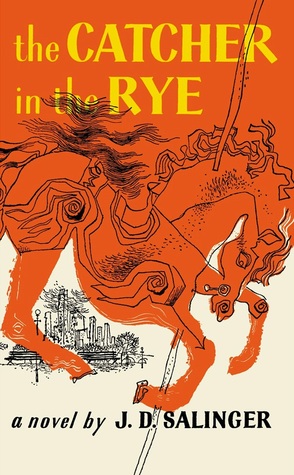 Catcher in the Rye
Catcher in the Rye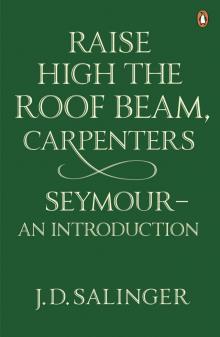 Raise High the Roof Beam, Carpenters & Seymour: An Introduction
Raise High the Roof Beam, Carpenters & Seymour: An Introduction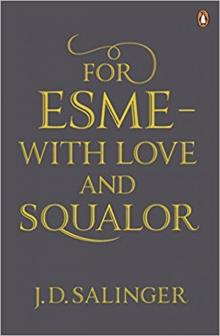 For Esmé, With Love and Squalor
For Esmé, With Love and Squalor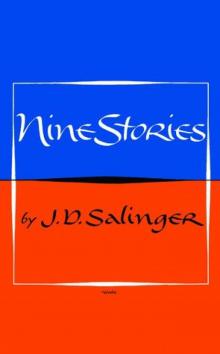 Nine Stories
Nine Stories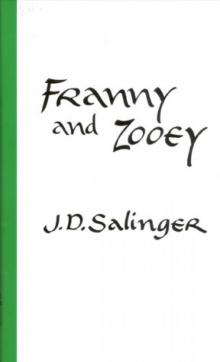 Franny and Zooey
Franny and Zooey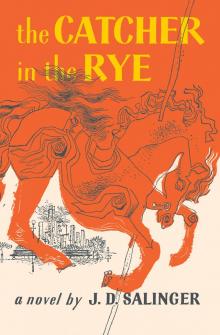 The Catcher in the Rye
The Catcher in the Rye Three Stories
Three Stories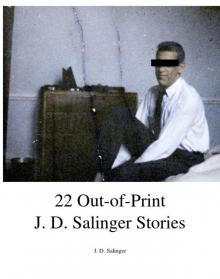 22 Out-of-print J. D. Salinger Stories
22 Out-of-print J. D. Salinger Stories